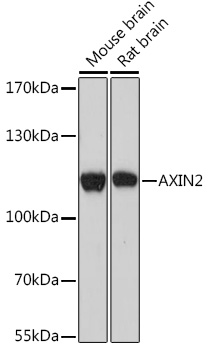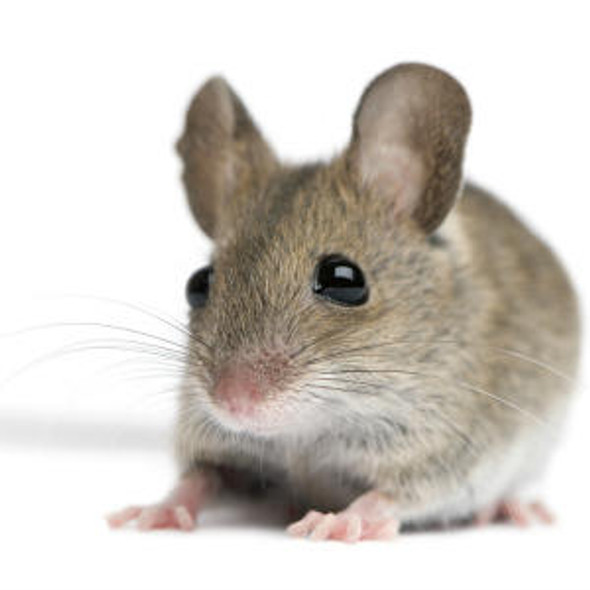Anti-AXIN2 Antibody (CAB17021)
- SKU:
- CAB17021
- Product type:
- Antibody
- Reactivity:
- Mouse
- Rat
- Host Species:
- Rabbit
- Isotype:
- IgG
- Antibody Type:
- Polyclonal Antibody
- Research Area:
- Metabolism
Description
| Antibody Name: | Anti-AXIN2 Antibody |
| Antibody SKU: | CAB17021 |
| Antibody Size: | 20uL, 50uL, 100uL |
| Application: | WB |
| Reactivity: | Mouse, Rat |
| Host Species: | Rabbit |
| Immunogen: | A synthetic peptide of human AXIN2. |
| Application: | WB |
| Recommended Dilution: | WB 1:500 - 1:2000 |
| Reactivity: | Mouse, Rat |
| Positive Samples: | Mouse brain, Rat brain |
| Immunogen: | A synthetic peptide of human AXIN2. |
| Purification Method: | Affinity purification |
| Storage Buffer: | Store at -20°C. Avoid freeze / thaw cycles. Buffer: PBS with 0.02% sodium azide, 50% glycerol, pH7.3. |
| Isotype: | IgG |
| Sequence: | Email for sequence |
| Gene ID: | 8313 |
| Uniprot: | Q9Y2T1 |
| Cellular Location: | Cytoplasm |
| Calculated MW: | 93kDa |
| Observed MW: | 110kDa |
| Synonyms: | AXIN2, AXIL, ODCRCS, axin-2 |
| Background: | The Axin-related protein, Axin2, presumably plays an important role in the regulation of the stability of beta-catenin in the Wnt signaling pathway, like its rodent homologs, mouse conductin/rat axil. In mouse, conductin organizes a multiprotein complex of APC (adenomatous polyposis of the colon), beta-catenin, glycogen synthase kinase 3-beta, and conductin, which leads to the degradation of beta-catenin. Apparently, the deregulation of beta-catenin is an important event in the genesis of a number of malignancies. The AXIN2 gene has been mapped to 17q23-q24, a region that shows frequent loss of heterozygosity in breast cancer, neuroblastoma, and other tumors. Mutations in this gene have been associated with colorectal cancer with defective mismatch repair. |
| UniProt Protein Function: | axin 2: is a negative regulator of the Wnt pathway, which is critical in stem cell signaling, morphogenesis, the mesenchymal-epithelial transition, and many cancers. Axin functions as a tumor suppressor. Probably facilitates the phosphorylation of beta-catenin and APC by GSK3B, leading to their ubiquitination and subsequent proteolysis. Is downregulated during progression of esophageal squamous cell carcinoma. Axin1/2 mediate cross-talk between TGF-beta and Wnt signaling pathways. |
| UniProt Protein Details: | Protein type:Adaptor/scaffold Chromosomal Location of Human Ortholog: 17q24.1 Cellular Component: nucleoplasm; microtubule cytoskeleton; Golgi apparatus; centrosome; cytoplasmic microtubule; cytoplasm; cytoplasmic membrane-bound vesicle; postsynaptic density; plasma membrane; cell cortex; cytosol; nucleus; beta-catenin destruction complex Molecular Function:protein binding; enzyme binding; ubiquitin protein ligase binding; beta-catenin binding; protein kinase binding; GTPase activator activity Biological Process: odontogenesis; negative regulation of cell proliferation; cell proliferation; intramembranous ossification; regulation of mismatch repair; mRNA stabilization; dorsal/ventral axis specification; negative regulation of osteoblast differentiation; positive regulation of protein amino acid phosphorylation; maintenance of DNA repeat elements; bone mineralization; positive regulation of GTPase activity Disease: Oligodontia-colorectal Cancer Syndrome |
| NCBI Summary: | The Axin-related protein, Axin2, presumably plays an important role in the regulation of the stability of beta-catenin in the Wnt signaling pathway, like its rodent homologs, mouse conductin/rat axil. In mouse, conductin organizes a multiprotein complex of APC (adenomatous polyposis of the colon), beta-catenin, glycogen synthase kinase 3-beta, and conductin, which leads to the degradation of beta-catenin. Apparently, the deregulation of beta-catenin is an important event in the genesis of a number of malignancies. The AXIN2 gene has been mapped to 17q23-q24, a region that shows frequent loss of heterozygosity in breast cancer, neuroblastoma, and other tumors. Mutations in this gene have been associated with colorectal cancer with defective mismatch repair. [provided by RefSeq, Jul 2008] |
| UniProt Code: | Q9Y2T1 |
| NCBI GenInfo Identifier: | 12643949 |
| NCBI Gene ID: | 8313 |
| NCBI Accession: | Q9Y2T1.1 |
| UniProt Secondary Accession: | Q9Y2T1,Q3MJ88, Q9H3M6, Q9UH84, |
| UniProt Related Accession: | Q9Y2T1 |
| Molecular Weight: | 843 |
| NCBI Full Name: | Axin-2 |
| NCBI Synonym Full Names: | axin 2 |
| NCBI Official Symbol: | AXIN2 |
| NCBI Official Synonym Symbols: | AXIL; ODCRCS |
| NCBI Protein Information: | axin-2; conductin; axin-like protein; axis inhibition protein 2 |
| UniProt Protein Name: | Axin-2 |
| UniProt Synonym Protein Names: | Axin-like protein; Axil; Axis inhibition protein 2; Conductin |
| Protein Family: | Axin |
| UniProt Gene Name: | AXIN2 |
| UniProt Entry Name: | AXIN2_HUMAN |







